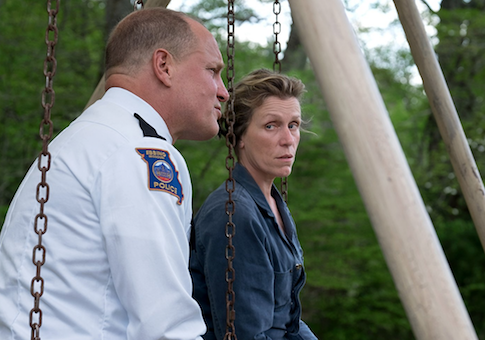This review contains spoilers for Three Billboards Outside Ebbing Missouri.
The first half of Three Billboards Outside Ebbing, Missouri, is one of the best films I've seen this year, a perfect mix of heartbreak and humor with a mean streak that juggles some of the day's weightier issues without offering easy answers.
Unfortunately there's also a second half.
Mildred (Frances McDormand), frustrated by local police chief Willoughby's (Woody Harrelson) inability to find the man who raped and murdered her daughter, settles upon a novel way to increase visibility of the crime and track down the killer. She rents three billboards on a rarely traveled byway that spell out a simple message in red and black: "Raped while dying" / "And still no arrests?"/ "How come, Chief Willoughby?"
Mildred's unorthodox approach arouses the ire of the local cops, who have been stymied by a lack of clues. Willoughby, suffering from a fatal bout of cancer, is nonplussed by the signage but understands her motherly despair. His deputy, Dixon (Sam Rockwell), is less accommodating: prone to violence and under fire for abusing an African-American suspect before the movie begins, Dixon's misbehavior escalates as the movie goes along.
British writer/director Martin McDonagh (In Bruges, Seven Psychopaths) has a lot of thoughts about the American justice system—specifically, the somewhat tyrannical nature of many small town cop shops—and filters them through the prism of Dixon, an unrepentant racist and notable dullard. (How dull? He reads comic books at his desk while one of his victims reads Flannery O'Connor at his. Subtlety is not much in play here.) Rockwell is earning much praise and awards-season buzz for his work as the dopey Dixon, but the real standout in Three Billboards is the far more muted Harrelson. And the movie really suffers from his absence after he commits suicide at the film's midway point.
All of the action in the first half of Three Billboards runs not through the nominal lead, Mildred, but through Chief Willoughby. It's Willoughby who has to be pressured to solve the murder, Willoughby who leans on the owner of the advertising company to get him to take down the signs, Willoughby whose terminal diagnosis puts an unofficial time limit on solving the case, Willoughby whose tolerance for Dixon earns the police our distrust.
Indeed, the best scene in the movie—one of the best scenes I've seen all year, actually—is Willoughby's exeunt. Choosing to kill himself rather than waste away in front of his wife and kids, Harrelson's voiceover narration of Willoughby's goodbye letter to his wife is pitch-perfect. McDonagh's writing flawlessly walks a very fine line: It's tear jerking without being maudlin or mawkish, blending just the right amount of humor and sadness to make something real.
But the film goes off the rails after that. It's clear what McDonagh did not want to do—provide easy catharsis to audience members by handing over a miraculously discovered killer—but the circuitous path he takes to get us to this non-destination feels increasingly desperate and almost silly by the end. And while McDonagh has a lot of ideas about police brutality, he casually tosses them aside as the movie progresses. It's not as though the playwright should be expected to solve the problem of police brutality, but the modicum of redemption offered to Dixon in the closing half hour of the movie feels clumsy and forced and, frankly, contrary to what preceded it.
Fans of McDonagh's previous work will find much to enjoy here. The film is often genuinely funny. Dixon's riff on the semantics of racist violence—"person-of-color torturing" is the preferred nomenclature in these more socially aware days of ours, apparently—is bound to inspire awkward guffaws. It's just too bad Three Billboards Outside Ebbing, Missouri can't maintain that sensibility throughout its duration.
